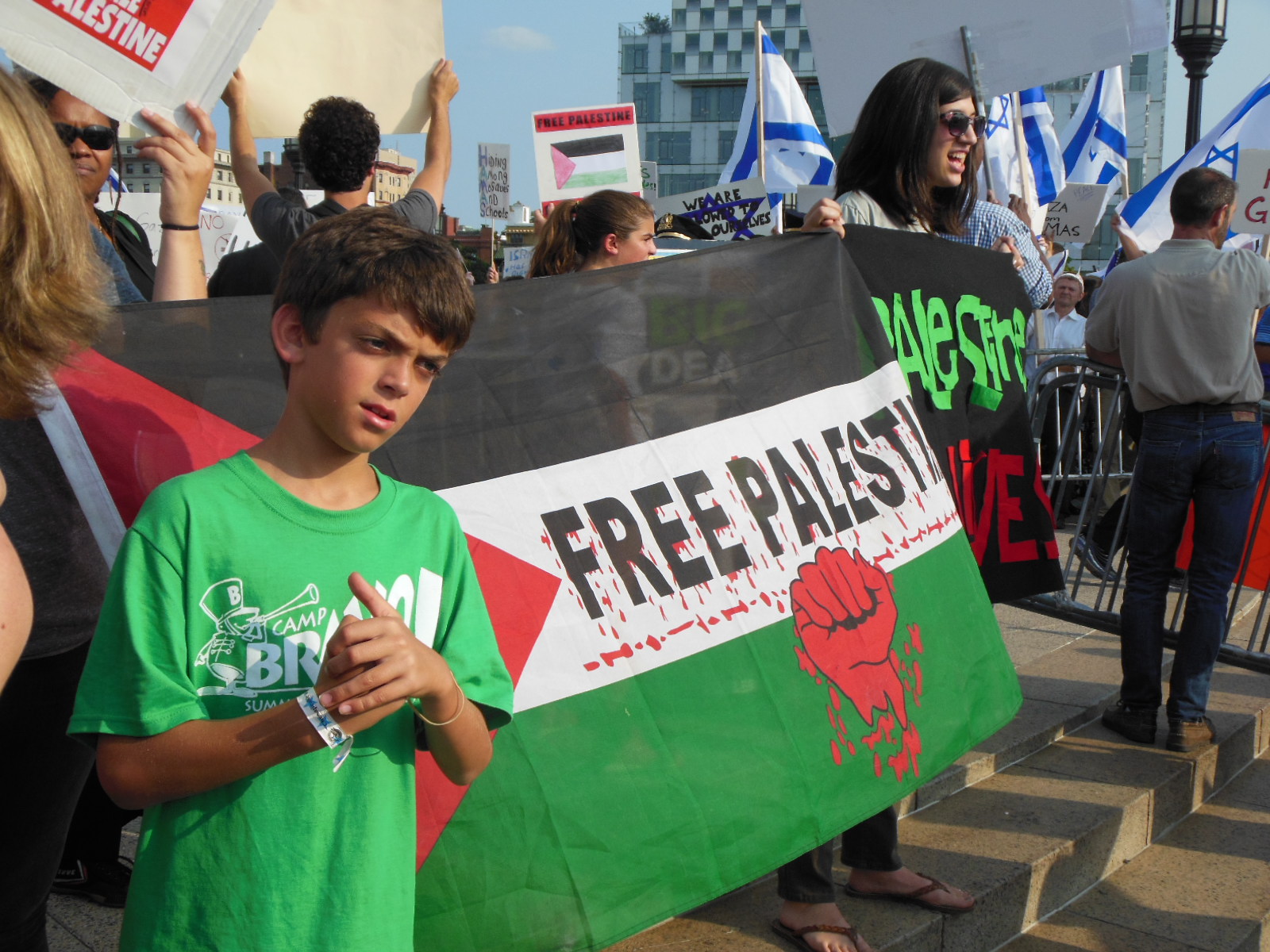Conflict in Gaza brings hundreds out for solidarity rallies
The Pro-Palestinian side of the Penn Station rally in Baltimore. (Anthony C. Hayes)
Three demonstrations were held in Baltimore last week, allowing area residents a chance to speak out on the current conflict in Gaza. Presenting opposing sides of the conflict, the events were sponsored by student led groups from Johns Hopkins University.
On Wednesday, protesters representing both Palestinian and Israeli concerns gathered along North Charles St. at the Penn Station for two raucous rush hour rallies followed by separate marches to North Ave.
The Baltimore Post-Examiner estimates that participants on the Pro-Israeli side numbered in excess of seven hundred. A smaller but no less enthusiastic crowd of about two hundred demonstrated for the Palestinian side.
Rudy Stoler was one of the participants who caught a chartered bus to Penn Station from the Greenspring Shopping Center. The shopping center also hosted The Bomb Museum exhibit last week.
“I think it’s great that people turned out from all across the area,” Stoler said. “It seems like every group was represented there.”
Stoler noted that for many in the Baltimore Jewish community, the ongoing conflict hits close to home.
“Jordan Low – a 2013 graduate of Beth Tfiloh – was wounded in an explosion in Gaza. Thankfully he survived, but several of the guys he was with didn’t.”
* * * * *
For Frank Lee of Baltimore, the conflict also has a personal facet.
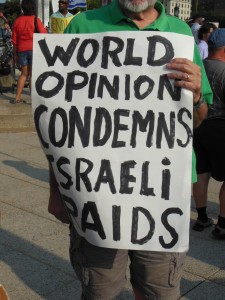
“I have family in Israel in the city of Lod, near Ben Gurion airport, so they’re in the line of fire from all directions. My daughter-in-law is an Israeli citizen of Palestinian descent.”
Lee said the Wednesday protest rally was the first he had ever attended. “Such a tragic war. Israel has been terrorizing that country since 1948 when they went house-to-house killing people just to get them out. Jews are attempting genocide, just as Hitler attempted genocide against them. It goes back to the Bible – brother against brother – and the US is financing the whole thing.”
“It’s a shame,” Lee continued, “that they (Gaza) are blockaded. What kind of a country has to build tunnels just to get into their own land?”
When asked if he was concerned about published reports that the tunnels were being used primarily for smuggling arms and launching terrorist attacks, Lee said, “You need to read other news papers to find the truth. Even PBS has been pretty slanted (toward Israel) in its coverage.”
Lee’s suggested source for accurate reporting on the current crisis?
“Watch Al Jezeera.”
* * * * *
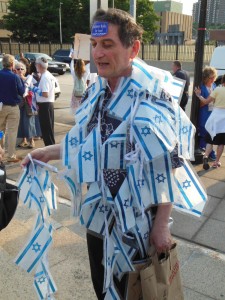
Area resident Marshall Lewis said he was glad he made it out for the rally, but added, “These things are often a little too late. What we get from our heads of state are platitudes. Mere words are not going to change the world situation.”
Ilya Elashvili, who was born and raised in the Republic of Georgia, insisted that it was right for the Israeli leadership to take action
“Many people forget that the first priority of the government is to protect its people. If a government cannot provide that protection, they aren’t worth anything. It is their utmost function.”
Conversely, one pro-Palestinian protester compared Israel’s actions in Gaza to apartheid. When asked to expound on that statement, he admitted he really did not know anything about the history of the conflict, but was nevertheless supporting the Palestinian side because his wife is Muslim.
* * * * *
Friday’s rally on the corner of St. Paul and 33rd streets was decidedly smaller but no less animated, drawing about fifty people to demonstrate for the Israeli cause. Unfortunately, a special guest speaker from the Israeli embassy had to cancel his appearance after it was learned that Hamas broke a 72-hour cease-fire agreement and captured a young IDF officer while also killing two IDF soldiers.
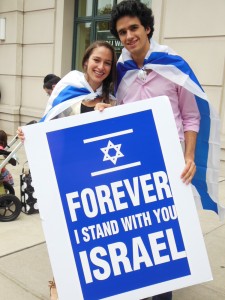
Rally co-organizer Jeremy F. reacted to the news of the kidnapping and killings, saying, “I think that shows what Israel is dealing with; that with Hamas they are dealing with a terrorist organization.”
Pikesville resident Lev Bar-Av said he attended both rallies to encourage American support for the Israeli cause.
“My sister lives in Tel Aviv; I have other cousins in Israel. They have rockets flying over them indiscriminately. My sign says, ‘USA – Thank You for Funding the Iron Dome.’ We do not want American support to be withdrawn from Israel.”
When asked how he would respond to reports that Israel has been bombing schools and hospitals, Bar-Av replied, “It’s very simple. The Hamas strategy is to use human beings as shields. It’s pretty obvious. Some of the UN shelters in Gaza have been bombed by their own rockets. When you see Israel attacking those places it’s because Hamas is shooting from there. The IDF is not killing indiscriminately the way Hamas does.”
* * * * *
Though emotional, the nonviolent nature of the protests cannot be overstated. At Wednesday’s demonstrations, the Baltimore City Police Department did an excellent job maintaining order; keeping the two sides at arms length to ensure a peaceful event. There was also a police presence on Friday for the pro-Israel rally.
Some have worried that student sponsored demonstrations could lead to anti-semitism at Johns Hopkins University. Hopkins student Ryan, a participant at Friday’s rally, was asked if he has seen any troubling signs on campus.
“I’m not Jewish, so I may not be the best person to answer that question, but I haven’t seen or heard of any problems with anti-semitism. I think that the campus is very accepting of people of all religions. The disagreements on this issue are political, not personal.”
Event co-sponsor Nicole agreed with Ryan’s take on civility at Hopkins, pointing out that Johns Hopkins is one of the few schools to out-rightly reject the proposed American Studies Association (ASA) sanctions against Israeli academics. Among other things, the sanctions would have prevented interaction with Israeli universities and the publication of academic papers sympathetic to Israel.
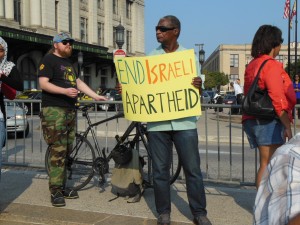
Still, Nicole wondered about what she considers ignorance of the issues surrounding the conflict and a corresponding rise of animosity toward the Jews.
“I find that most people who support the Palestinian side have a very weak understanding of history, from both ancient times and from 1948. They also don’t seem to understand what Israelis must do to defend themselves against people who have made their intentions clear in their commitment to violence and the destruction of Israel.”
“How long has it been since World War II,” she asked, “Seventy years? And you see these tweets and hashtags that say, ‘Bring Hitler back to finish what he started.’ That’s very scary and sick to me. I’m afraid those sentiments are a result of what is being espoused by pro-Palestinian groups. That’s what they are encouraging their followers to do.
“They’re not looking for peace; if they were they would have accepted the previous cease-fires. That’s very clear and it’s sad.”

Anthony C. Hayes is an actor, author, raconteur, rapscallion and bon vivant. A one-time newsboy for the Evening Sun and professional presence at the Washington Herald, Tony’s poetry, photography, humor, and prose have also been featured in Smile, Hon, You’re in Baltimore!, Destination Maryland, Magic Octopus Magazine, Los Angeles Post-Examiner, Voice of Baltimore, SmartCEO, Alvarez Fiction, and Tales of Blood and Roses. If you notice that his work has been purloined, please let him know. As the Good Book says, “Thou shalt not steal.”

